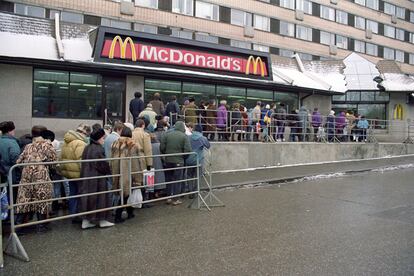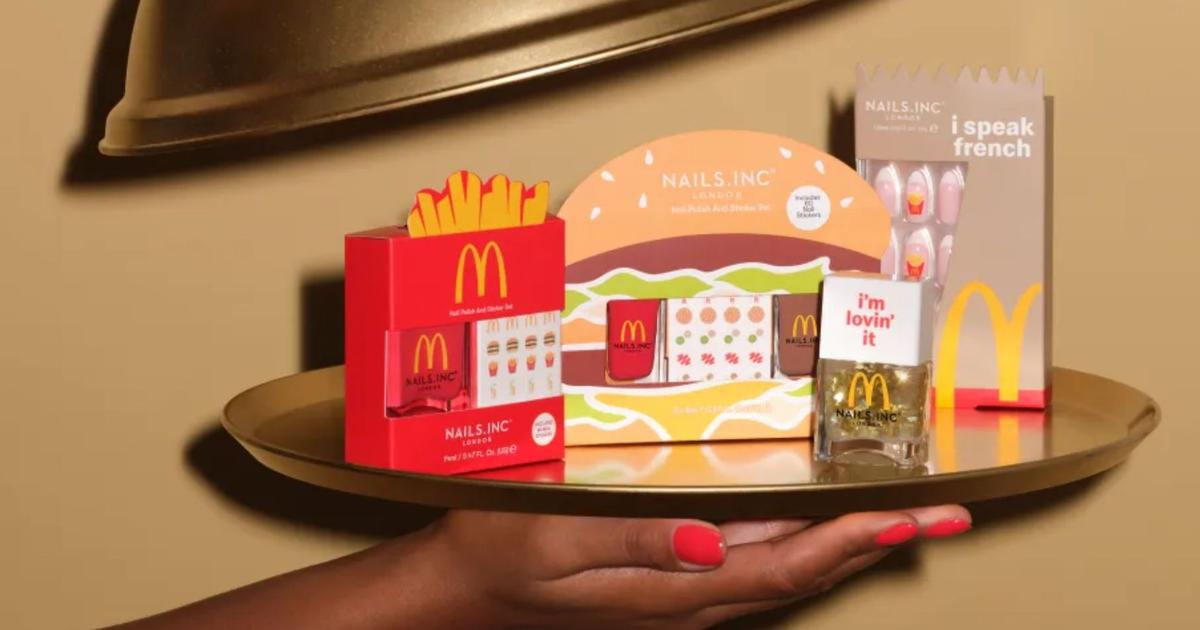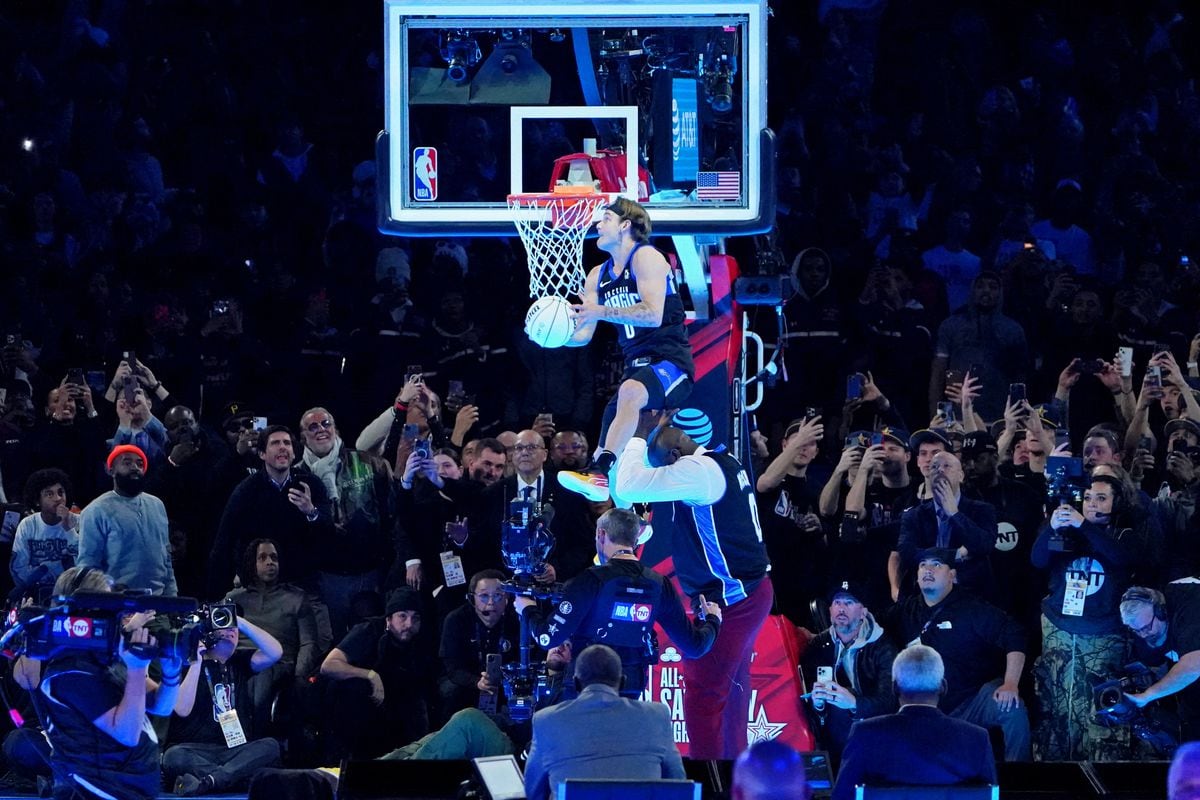In 1998, the year of the ruble crisis, former Soviet President Mikhail Gorbachev shot a controversial advertisement for Pizza Hut.
Two clients were arguing: a man dressed as a conservative Russian who seemed to have just stepped out of the time tunnel and another young liberal with a much more modern
look
and better dressed.
“Because of him we have economic chaos” and “political instability”, said the first, to which the “modern” Russian replied that Gorbachev brought “a new opportunity” and “freedom” to the country.
At the end, an older lady mediated and everyone toasted because the American fast food chain had arrived with him.
Ten years earlier, in 1988, Estée Lauder opened its first office in Moscow.
In 1990, she landed the first McDonald's in the Soviet Union in front of Pushkin Square.
Three decades of opening to the West that could have come to an end this Wednesday with the last Big Mac served, for now, in the Russian capital.
More information
The war in Ukraine, live
American multinationals have suspended their activity in Russia due to the economic uncertainty that hangs over the country.
All promise to keep their thousands of jobs in the short term, although they wait for it to become clearer how much a ruble will be worth in the future and prefer to wait to sell hamburgers at a loss.
The central bank has been striving to soften the devaluation of the ruble since the Russian offensive began on February 24, but its horizon is still unclear: it has gone from trading at 85 rubles per euro before the war to around 125, almost 50 % less value.
The same night that some historical companies announced their temporary closure, the regulatory body announced a “soft” corralito for foreign currency accounts.
McDonald's opened its first restaurant on January 31, 1990. Hundreds of people crowded that day in front of the building, much more personal then, with its classic tile roof, than with today's cold avant-garde redesign, where only the big m indicates that that is not a museum or an office building.
Queues at a McDonald's in Moscow in 1992. DIMA KOROTAYEV (EFE)
“The
Bolshoi
(big in Russian, like
Big
in English) Mac is something you've never tried before,” an employee said 32 years ago, according to a
Washington Post
chronicle from the time .
This Wednesday hundreds of people packed the same place, the vast majority of them kids who never knew the Russian nineties.
The chain has 850 restaurants in the country.
Unlike McDonald's, its rival Burger King has decided to stay in business.
“We will continue working in Russia and we will open new restaurants in 2022 ″, its communications director, Iván Shestov, told the Interfax agency, although he acknowledged some difficulties in the supply of raw materials.
“We remain firmly on our feet,” he added.
Coca-Cola is another symbol of the West that has abandoned Russia for now.
More than 60 years ago, the theft of its formula by the Soviet Union inspired one of Billy Wilder's most famous films,
Un, dos, tres
, and its first bottles arrived in the USSR in 1979 for the Moscow Olympics. , which, in another parallelism with the current Russian sports veto, would end up being boycotted by the West due to the invasion of Afghanistan.
The US company announced that it will temporarily stop supplying its drink to Russia, where it does not have bottling plants.
The consequences of these suspensions are unknown and some voices in Russia advocate nationalizing the companies.
The owner of Pizza Hut opted for an intermediate position to that of both burger joints.
Yum!
(in Spanish something similar to ¡Ñam!) announced that it is temporarily closing the 70 Kentucky Fried Chicken (KFC) restaurants and the 50 Pizza Hut restaurants that it owns, although the thousand KFCs that are franchised will remain open.
“Yum!
It will redirect all profits from its operations in Russia to humanitarian aid.
Furthermore, we remain focused as always on the safety of our people in the region and will act decisively to support our teams in Ukraine."
Goodbye Levi's
However, one of the biggest American icons for the Soviets that is now closing was not the restaurants, but the Levi Strauss brand.
As happened in Spain with jeans, its design coined another neologism in the Slavic countries, the
dzhinsy
, from the English
jeans
, and they were one of the most demanded products during the smuggling of the eighties.
Levi Strauss announced on March 7 that it was suspending sales in Russia, where it earned 2% of its turnover last year.
“But any consideration of business is clearly secondary to the human suffering experienced by so many.
The Levi Strauss community remains saddened by the devastating conflict in Ukraine and our thoughts are with all those who have been affected, including our employees, partners and their loved ones," the company said in a statement.
The cosmetics company Estée Lauder was also one of the pioneers in opening the market in Russia.
Its first office dates back to 1988, and at that time it attracted more curious people than clients.
The company had American prices, like $15 for lipstick, when the average Russian wage was around $245 a month, according to another
Los Angeles Times
account of that opening .
“Estée Lauder continues to be devastated by the tragic invasion of Ukraine.
We are with those who suffer, including our employees and their families and acquaintances in Ukraine, ”the firm denounced in a second statement published this Sunday where it revealed the closure of all its stores after announcing days before the suspension of its investments in Russia.
“We will continue to monitor the situation and take action consistent with our company values,” he added.
If these firms represented the opening of the nineties, Ikea, which has also announced its closure, has been the symbol of the westernization of Russia in the early days of Vladimir Putin.
The globalization of Swedish furniture has been all the rage in the country since the opening of its first store in 2000 on the outskirts of Moscow, and Russian houses have never looked the same again.
His stores —both his own establishments and those that were the result of his alliance with the Mega supermarket chain— brought a new style to the houses when an emerging middle class began to grow in the first decade of Putin.
Follow all the international information on
and
, or in
our weekly newsletter
.
Exclusive content for subscribers
read without limits
subscribe
I'm already a subscriber














